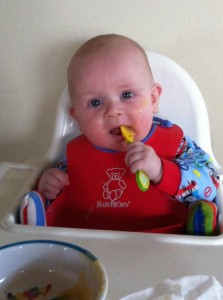
Feeding your bub or toddler can be a time consuming process and dealing with a fussy eater makes it all the more lengthy. Having a bub who spends more time playing with their yoghurt than eating it can also cause anxiety amongst parents who worry about their child missing out on nutrients and ending up hungry.
Research has shown that setting up good eating habits from a young age can help children to establish a positive relationship with food and nutrition so sorting out the fussiness as soon as possible is a good thing.
Before you pull out all your hair (and serve fish fingers every night!), try our top tips for dealing with your little fusspot.
- Try and try again – It’s not unusual for a baby to refuse a new food the first time. Studies have shown that it can take up to 10 attempts before a baby will accept a new taste, so keep trying!
- Slowly does it – Don’t overwhelm your little foodie with too many new tastes and flavours at the one time. Take your time and introduce a couple of similar foods at a time.
- Choose the best time – If your baby or toddler is absolutely exhausted by 6pm, dinner is always going to be a battle. Try moving dinner time forward to a time when energy levels aren’t as low as you won’t get as much cranky resistance.
- Check your temps – Kids tend to prefer food warm, but not hot. By offering something that burns their mouth, they may be turned off for an extended period. Have a little taste or dip your pinky into your dish before serving.
- Back to basics – It’s common knowledge that the majority of kids are keen on quite bland food. When you’re just starting out with solids, sticking to reasonably bland foods before introducing something more interesting can eliminate fussiness issues. If your toddler has a fixation with beige, try offering them their favourites with a side of something new.
- Two spoons are better than one – Toddlers in particular LOVE being independent. By offering a second spoon, they are kept busy and feel as if they’re part of the process.
- Don’t be afraid of finger food – Babies and toddlers love holding things and are naturally inclined to smell and taste new objects. Offer a range of finger foods for your little one to play with and you may be suprised how much they eat.
- Keep servings small – A big serving of food, especially new food, can be overwhelming for a fussy eater. Keep portions small and non-threatening for your best chance of success.
- Mix it up – Mix some favourite foods in with the new ones you want to introduce. Babies and toddlers will be less wary of the new when they see it alongside something familiar.
- Lessen mess – Save your floors/carpets/tiles by using a plastic floor protector under your baby’s highchair so that mess can be wiped clean.
GET YOUR 10% DISCOUNT
If you are ready to lose weight then the Lose Baby Weight plans offer a healthy and safe exercise and diet routine and you can get a 10% discount by using code LOYALTY at the checkout
PLUS our BEST SELLING 28 Day Diet & Exercise Plan has now launched as an 84pg Printed Book and you can get your copy here
Click HERE to see our shop
